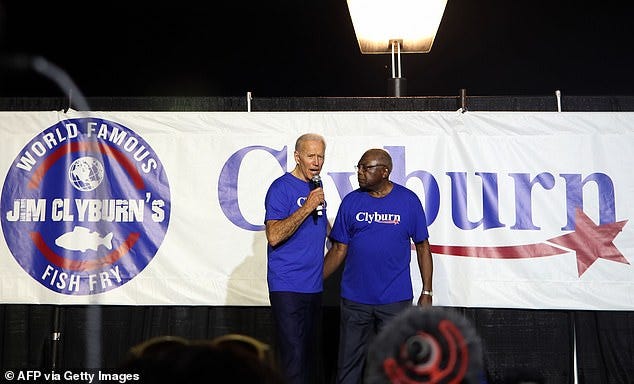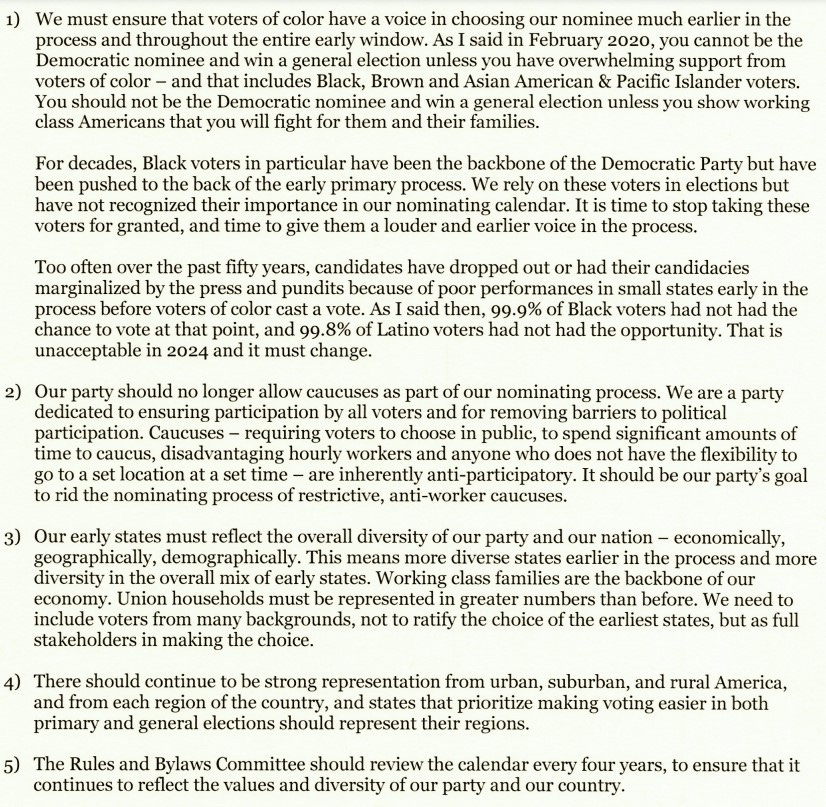Sorry, Iowa, You're Just Too White
National Democrats' brazen move to eliminate the first-in-the-nation Iowa caucus is more than a rejection of Iowa. It rejects real civic engagement.
The Democratic National Committee, apparently at the behest of President Joe Biden, is poised to replace Iowa as the first presidential nominating caucus for South Carolina, followed quickly by New Hampshire and Georgia on the same day, followed by Michigan and Nevada. The Silver State presumably would have to ditch its caucus system for a primary. From the Washington Post:
Democratic leaders voted Friday to adopt the transformative early 2024 presidential nominating schedule proposed by President Biden, giving South Carolina the leadoff position, followed by a joint primary day for New Hampshire and Nevada, with later primaries by Georgia and Michigan.
The chosen states were given until Jan. 5 to demonstrate that they can hold their primary contests on their assigned dates or risk losing their positions in the calendar.
The new calendar upends decades of tradition in which Iowa and New Hampshire held the first two slots for both Democratic and Republican nominating contests. Biden said the remaking of the primary calendar will better reflect the demographic, economic and geographic diversity of the Democratic Party.
Democratic chairman Jaime Harrison, a South Carolina native, who was informed of the decision Thursday night, reacted emotionally to the vote putting his state first, describing the decision as a way of honoring non-White, non-college educated and impoverished voters like his grandparents.
Republicans, I assure you, will not follow suit. They will not likely fix that which is not broken. At least in this instance.
New Hampshire state law requires that it serve as the nation’s first presidential primary, so this will be interesting. New Hampshire Democrats are Not Happy. Iowa Democrats, who no longer hold a single congressional seat or any statewide office, seem resigned.
Never mind that Iowans in 2020 gave South Bend, Indiana, Mayor Pete Buttigieg the most delegates, even as US Sen. Bernie Sanders (I-VT) won the most votes. Biden finished fourth. Biden also lost the proudly first-in-the-nation New Hampshire primary to Sanders. Biden finished fifth behind Sen. Elizabeth Warren.

What saved Biden’s candidacy in 2020? South Carolina’s primary election, thanks to a critical endorsement from House Democratic Whip James Clyburn, spurred by a Democratic establishment terrified of a Sanders nomination. It was Biden’s first primary victory and sent him to the nomination. How convenient, looking to an increasingly likely candidacy at age 82 in 2024, that Biden would elevate states he won in 2020 to his party’s first primary while dissing those he lost. Pretty brazen. To the victor (the Democratic party elite?) goes the spoils.
In a letter to the Democratic National Committee’s Rules and Bylaws panel, Biden blatantly pandered to Black Democrats, effectively calling for wiping Iowa off the Democratic presidential primary map:
I’m sure South Carolina Republicans, who hold every elected statewide position and all but one congressional seat (Clyburn’s), won’t mind the attention. They may try to persuade the Republican National Committee to follow suit. But that’s a non-starter, and they know it. Besides, Iowa doesn’t have an excellent track record regarding the winner of their presidential caucuses going on to win the nomination (or counting ballots, for that matter). Ted Cruz won in 2016. Rick Santorum won in 2012 (eventually). Mike Huckabee won in 2008. None would win the nomination.
Here are a few observations about this rather sudden move by the President and the DNC, which he (or his White House) controls. First, he and the people around him want to clear the decks for a possible renomination in 2024, despite his age and obvious infirmity. Or, perhaps, control who might succeed him. Secondly, Democrats are worried about their erosion of support among people of color. The GOP share of the Hispanic, Black, and Asian vote grew in 2022 over the last mid-term election and showed signs of growth at the presidential level between 2020 and 2016.
Of greater interest to me is the dissing of the caucus system, long a feature (bug?) of Iowa’s nominating elections and those of other states in different elections, including Virginia. Democrats and not a few Republicans believe caucuses are too much work, cater to the more extreme elements of their respective parties, and don’t produce the best candidates. In their minds, it is easier to hold an election and get people to mail it in from the convenience of their La-z-boy recliners.
I get the ease of primary elections over labor-intensive caucuses. I even get that primaries can theoretically produce candidates with broader appeal. But there is something truly American about the Iowa and Nevada caucus systems - they allow candidates to build support in small states with extraordinary grassroots organizing efforts. I’ll let iowastartingline.com make the case:
The structure of Iowa’s precinct caucuses was an overly-complicated system that excluded people and should have been heavily reformed or abandoned years ago. However, it did bring one benefit that Democrats should strive to replicate somehow elsewhere—it forced candidates to campaign everywhere in the state and build up strong, grassroots organizations.
You couldn’t simply run up the totals in one area of Iowa or with one group of supporters. A deluge of TV ads wouldn’t cut it, and a hard-working activist well-known in their community was worth way more than the 12th direct mail piece.
The vast field operations that Democrats built here in Iowa also greatly contributed to the party’s longterm staffer/operative pool in nearly every state around the country. Campaigns’ experiments and innovations here informed best practices in countless other non-Iowa races.
Working on an Iowa Caucus campaign was often described as “resume gold” in Democratic politics, not because of the connections you made out of it, but because organizing here was a great trial-by-fire experience. Iowa field staffers had to build meaningful, personal relationships with the voters they hoped to win over. It made them far better operatives than if they had simply climbed the ladder in the D.C. circuit.
Presidential campaigns were already moving toward a more national, social media and cable news-hit method of building momentum. That is a bad development, and one that voters in the remaining/new early states should push back on. Don’t support a candidate who won’t campaign locally, meet real people and listen to their personal stories—it’s extremely helpful to them and the party overall, even if nervous campaign strategists fear unscripted moments.
Iowa voters are a special kind of breed. With decades of presidential primary experience, they are educated and informed and used to meeting and challenging prospective presidents with intensive questions. It is a humbling crucible. Just ask any candidate who has been through it. Are South Carolina’s Democratic primary voters up to that standard? We’ll see.
Primaries cater to big-money candidates and the independent, dark-money “super PACs” they primarily create to support them with undisclosed big-money contributions and massive broadcast ad campaigns, coupled with intensive early voting and absentee mail efforts.
Oh, sure, Democratic volunteers and staff will flood Clyburn’s heavily Black rural district, an inexpensive media market, along with parts of Charleston and a few other towns with organizational efforts. They may do the same with Nevada, focusing exclusively on heavily Democratic Clark County (Las Vegas and environs). Given the pandering they are like to engage in, I wonder how that will look to the rest of the country.
But Democrats dissing caucuses may prove helpful to Republicans who will still need to organize strong grassroots campaigns in Iowa, New Hampshire, and other primary states as a precursor to a general election campaign. While money helped elevate Mitt Romney to a failed nomination in 2012, former US Sen. Rick Santorum still won 11 states and, I would argue, set the stage for Donald Trump’s success in 2016. Trump stole Santorum’s message with lots more money and celebrity status. The rest, as they say, is history.
So Democrats, it seems, are doubling down on woke. Iowa and surrounding “flyover” states are taking notice. They’ve surrendered Iowa, a state Barack Obama won twice and, just eight years ago, was represented by at least one Democratic US Senator, Tom Harkin. They are la-z-fying our elections so voters can, when it comes to civic engagement, “mail it in.”
They’re all in on diversity, except that of thought. I’m reminded of this jewel from Chief Justice John Roberts: “The way to stop discrimination on the basis of race is to stop discriminating on the basis of race.”
We’ll see how all this evolves, but I’m reminded of an old maxim often attributed to Napoleon Buonaparte. “Never interfere with your enemy when he is making a mistake.”






